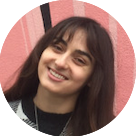Bernie Snell: Sociology and Philosophy to Full-stack Engineer to Blockchain and Quantum Physics
This is a continuation of our series exploring the paths that Recursers take to RC, what they do during their batch, and what happens after.
Bernie came to RC in 2019, and is currently working on her own blockchain project after winning a hackathon and receiving funding.

Here is Bernie’s story:
Before RC
I did a bootcamp in 2017 after dropping out of a PhD in sociology and philosophy. I was disillusioned with academia and the job prospects were terrible. I also liked traveling, so it seemed like engineering could be a viable remote job. I’ve always enjoyed math and science, and I received a targeted ad for a coding bootcamp when I was trying to decide what to do instead of my PhD - since I’ve always loved learning, I decided to give it a go. I finished the bootcamp, and did a year and a half with the best job that I’d ever had, where I got exposed to lots of different areas of software development since we were building 3D visualization software. I did a lot of vector math, and it exposed me to deeper ideas in programming. That’s really how I knew programming was for me and I decided to stick with it, and it also sparked a fresh interest in math and science.
I’d been there a year and a half and I felt like I’d learned a lot already. But I wanted to learn a language that wasn’t just JavaScript/TypeScript, and I realized that for me to continue to develop as a software engineer, I needed to learn other fundamentals like memory management and functional programming. I looked for bootcamps for non-junior engineers (and there weren’t a lot out there), and for programs with scholarships for women, which is how I found the Recurse Center.
During RC
I wanted to learn Rust because it seemed like it would teach me a lot of the things I wanted to learn. I was also interested in blockchain because I’ve always been interested in redistributive economics, and it seemed like a radical way to create new economic systems. My idea was to try and build a blockchain in Rust, and that’s what I did. I spent the first half of RC learning the language, and doing the Cryptopals challenges with other people. My detours at RC were that I got really into cryptography, followed by quantum science and quantum computing.
I had the chance at RC to go deeper into the mathematical side of things, too – if you haven’t done that at university, you don’t get a lot of space to carve out time to learn something like that.
The quantum science detour was really profound for me: I realized that I was deeply interested in it, and it shaped the direction I’d take in the future. I don’t think I would have had that insight without attending RC.
After RC
Straight after RC, I worked as a blockchain engineer, but I left that after a few months because the culture didn’t sit right with me. After that experience, I thought that I’d had enough of blockchain – it’s a world that has lots of potential, but I felt like most people there didn’t share my value system, so I decided to do something else. I worked at Sketch for a while, and left that a few months ago to pursue a new direction, and that’s when I entered a hackathon. I decided I shouldn’t be squeezed out of blockchain and that instead I should be an active participant in creating the future, so I decided to give it another go.
I ended up winning the hackathon, which came with some funding to continue working on the project, which is what I’ve been doing since. It’s a project built on the Internet Computer – a blockchain where the networking layer of the internet is also decentralized, which offers a more interesting alternative to something like IPFS. The app that I’m building is a location-based chat app, and I am partly building it with the idea that people will use it for community organizing. I also decided to pursue my interest in quantum science by learning more of the foundations, so last year I started a second remote degree in mathematics and physics.
I often have a voice in my head which tells me: “You’re not a good enough developer to be able to do this sort of low-level programming or solve these kinds of problems…” And now I’ve learned to reject it, to just sit here with a problem and bang my head against it until I arrive at a solution - that’s all anybody does, and I’m just as capable.
That’s what I like to try to do: take on things that seem too difficult, break them down and then sit with them until I understand them.
The fact that I’ve managed to mostly be in really diverse spaces has really helped me in this regard. In my first job I was very lucky that my boss was a woman who was a really amazing developer. It was a diverse company in general, and it was so fulfilling to be in that environment. The bootcamp was also diverse, as was RC and Sketch. In a way, I think I’ve been insulated from some of the more toxic areas of tech, and I think that’s been really beneficial for my growth and my mentality; RC was a big part of that.
